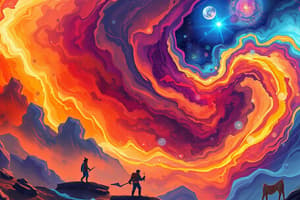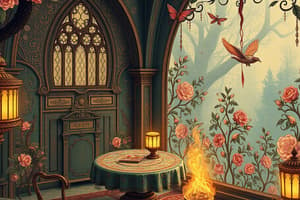Podcast
Questions and Answers
What is the primary colour that mixes with yellow to create green?
What is the primary colour that mixes with yellow to create green?
- Violet
- Blue (correct)
- Yellow
- Red
What is the term for the colours created by mixing one primary colour and one secondary colour?
What is the term for the colours created by mixing one primary colour and one secondary colour?
- Analogous Colours
- Primary Colours
- Secondary Colours
- Tertiary Colours (correct)
Which of the following colour pairs are complementary colours?
Which of the following colour pairs are complementary colours?
- Red and Orange
- Red and Green (correct)
- Blue and Green
- Violet and Yellow (correct)
What is the term for a group of 3-5 colours next to each other on the colour wheel?
What is the term for a group of 3-5 colours next to each other on the colour wheel?
What is the secondary colour created by mixing blue and yellow?
What is the secondary colour created by mixing blue and yellow?
What is the purpose of a colour wheel?
What is the purpose of a colour wheel?
What are the three primary colours that can mix to create all other colours?
What are the three primary colours that can mix to create all other colours?
What is created when two primary colours are mixed together?
What is created when two primary colours are mixed together?
What is the term for the colours created by mixing one primary colour and one secondary colour?
What is the term for the colours created by mixing one primary colour and one secondary colour?
Which of the following is NOT a secondary colour?
Which of the following is NOT a secondary colour?
What is the purpose of organizing colours in a circular chart?
What is the purpose of organizing colours in a circular chart?
What is the name of the colour created by mixing blue and red?
What is the name of the colour created by mixing blue and red?
What is the complementary colour of violet?
What is the complementary colour of violet?
What is the relationship between blue and blue-green on the colour wheel?
What is the relationship between blue and blue-green on the colour wheel?
What is the secondary colour created by mixing blue and red?
What is the secondary colour created by mixing blue and red?
What is the colour opposite red on the colour wheel?
What is the colour opposite red on the colour wheel?
What is the colour between blue and green on the colour wheel?
What is the colour between blue and green on the colour wheel?
What is the colour that is between yellow and green on the colour wheel?
What is the colour that is between yellow and green on the colour wheel?
Flashcards are hidden until you start studying
Study Notes
Colour Wheel Relationships
- A Colour Wheel is a circular chart that organizes colours to show their relationships.
- It consists of primary, secondary, tertiary, complementary, and analogous colours.
Primary Colours
- Primary colours are Red, Yellow, and Blue.
- These three colours can mix to create all other colours.
Secondary Colours
- Secondary colours are Orange, Green, and Violet (Purple).
- They are made by mixing two primary colours together.
- Examples:
- Red + Yellow = Orange
- Blue + Yellow = Green
- Blue + Red = Violet
Tertiary Colours
- Tertiary colours are made by mixing one primary colour and one secondary colour.
- Examples:
- Red + Orange = Red-Orange
- Blue + Green = Blue-Green
- Yellow + Green = Yellow-Green
Complementary Colours
- Complementary colours are two colours opposite each other on the colour wheel.
- Examples:
- Red and Green
- Blue and Orange
- Violet and Yellow
Analogous Colours
- Analogous colours are a group of 3-5 colours next to each other on the colour wheel.
- Examples:
- Blue, Violet, Red
- Green, Yellow, Yellow-Orange
Colour Wheel Relationships
- The Colour Wheel is a circular chart that organizes colours to show their relationships.
- The Colour Wheel is composed of primary colours, secondary colours, tertiary colours, complementary colours, and analogous colours.
Primary Colours
- Primary Colours are the three colours that cannot be created by mixing other colours together: Red, Yellow, and Blue.
- Primary Colours can mix to create all other colours.
Secondary Colours
- Secondary Colours are colours created by mixing two primary colours together: Orange, Green, and Violet (Purple).
- Orange is created by mixing Red and Yellow.
- Green is created by mixing Blue and Yellow.
- Violet (Purple) is created by mixing Blue and Red.
Tertiary Colours
- Tertiary Colours are colours created by mixing one primary colour and one secondary colour.
- Examples of Tertiary Colours include Blue-Violet, Red-Violet, Red-Orange, Yellow-Orange, Blue-Green, and Yellow-Green.
Complementary Colours
- Complementary Colours are two colours opposite each other on the Colour Wheel.
- Examples of Complementary Colours include Red/Green, Blue/Orange, and Violet/Yellow.
Analogous Colours
- Analogous Colours are a group of 3-5 colours next to each other on the Colour Wheel.
- Examples of Analogous Colours include Blue, Violet, and Red, as well as Blue, Blue-Green, and Yellow-Green.
Studying That Suits You
Use AI to generate personalized quizzes and flashcards to suit your learning preferences.




